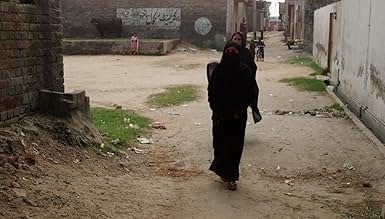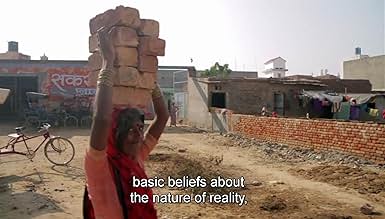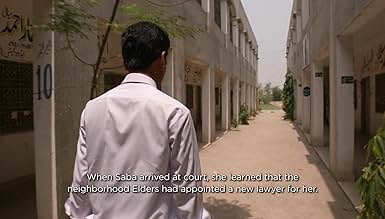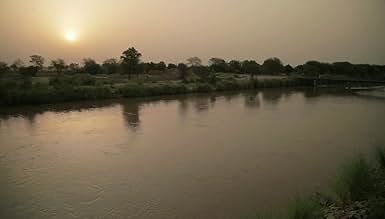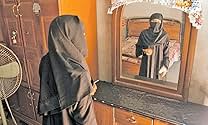A woman in Pakistan sentenced to death for falling in love becomes a rare survivor of the country's harsh judicial system.A woman in Pakistan sentenced to death for falling in love becomes a rare survivor of the country's harsh judicial system.A woman in Pakistan sentenced to death for falling in love becomes a rare survivor of the country's harsh judicial system.
- Director
- Stars
- Won 1 Oscar
- 3 wins & 2 nominations total
Featured reviews
A GIRL IN THE RIVER
THE PRICE OF FORGIVENESS
Sharmeen Obaid-Chinoy born in November 12, 1978) is a Canadian-Pakistani journalist, filmmaker and polbornitical activist known for her work in films that highlight gender inequality against women. Sharmeen Obaid-Chinoy won the Oscar for Short Documentary in 2012 for Saving Face. She's nominated again this year for A Girl in the River: The Price of Forgiveness. Both films tell the stories of Pakistani women mutilated or killed by radical moralists, and highlight the people around them fighting for societal progress.
It's a cliché to say that cinema has the power to change the world, but the reason it's become such a well-worn phrase is because films like Sharmeen Obaid-Chinoy's A Girl in the River: The Price of Forgiveness exist to make it happen and influence lawmakers at the highest level.
The filmmaker won her second Academy Award in the 'Best Documentary Short' category for the 40 Minute profile piece that premiered on HBO, and it ended up instigating similar change to her first winner, Saving Face, a haunting story centred on acid attacks made against women in Pakistan.
A Girl in the River follows Saba, a Year-old who survives an honour killing attempt made by her father and uncle after she defied their express wishes to elope with her husband. She was shot in the head, placed in a sack, and then dumped in the river, but miraculously managed to escape her near-fatal predicament and make her way to a local hospital, beginning a fight for justice that faced an uphill struggle to alter the traditional way of thinking in local society.
As Obaid-Chinoy explained to the International Documentary Association, her second Oscar-winning documentary reached all the way to the corridors of power, with the Pakistani prime minister vowing to make changes to the nation's existing legislation as it pertained to honour killings, driven largely by the impact of A Girl in the River.
Review written by artist jayakumar jrain.
Sharmeen Obaid-Chinoy born in November 12, 1978) is a Canadian-Pakistani journalist, filmmaker and polbornitical activist known for her work in films that highlight gender inequality against women. Sharmeen Obaid-Chinoy won the Oscar for Short Documentary in 2012 for Saving Face. She's nominated again this year for A Girl in the River: The Price of Forgiveness. Both films tell the stories of Pakistani women mutilated or killed by radical moralists, and highlight the people around them fighting for societal progress.
It's a cliché to say that cinema has the power to change the world, but the reason it's become such a well-worn phrase is because films like Sharmeen Obaid-Chinoy's A Girl in the River: The Price of Forgiveness exist to make it happen and influence lawmakers at the highest level.
The filmmaker won her second Academy Award in the 'Best Documentary Short' category for the 40 Minute profile piece that premiered on HBO, and it ended up instigating similar change to her first winner, Saving Face, a haunting story centred on acid attacks made against women in Pakistan.
A Girl in the River follows Saba, a Year-old who survives an honour killing attempt made by her father and uncle after she defied their express wishes to elope with her husband. She was shot in the head, placed in a sack, and then dumped in the river, but miraculously managed to escape her near-fatal predicament and make her way to a local hospital, beginning a fight for justice that faced an uphill struggle to alter the traditional way of thinking in local society.
As Obaid-Chinoy explained to the International Documentary Association, her second Oscar-winning documentary reached all the way to the corridors of power, with the Pakistani prime minister vowing to make changes to the nation's existing legislation as it pertained to honour killings, driven largely by the impact of A Girl in the River.
Review written by artist jayakumar jrain.
A country that is so strict with religion has such a loose and imperfect legal system. Such a comparison is to make people understand that the system, religion, is nothing more than a pretext for maintaining their reasonable and unequal treatment of others.
We follow a lovely, and at the same time incredible tough, 18 year old girl (Saba) who survives a murder attempt carried out by her father and uncle.
Her crime is to have fallen in love with the boy that her family wanted as her husband. A new decision about marriage is taken but Saba follows her heart instead of her fathers rules and runs off and gets married.
This act of independence is so hideous and dangerous that the only thing that can restore the family's honor is to kill her. She survives and through interviews with her, the police, a lawyer and family we start to get a picture of how women are looked at in a society that are governed by feudal laws.
Especially the interview with her father and uncle in prison makes us understand that daughters should be considered being in eternal debt to their father who has worked so hard to sustain their lives. If she gets "meal three times a day" then she shouldn't ask for more.
Womens rights are so neglected that if an honor killing is committed and the killer afterward are forgiven by his nearest family - then he walks free. So if Saba forgives her father then he will walk free and so the suspense starts. Will she do this or not? I will not spoil the last part of the story for you but just recommend the movie for being more than politic correct.
When you see Saba together with her newly wedded husband you simply cannot understand that this marriage is looked upon as a crime.
The happy end is that the movie has gotten so much attention that a fund raising has gotten the couple enough money to buy their own land.
/Simon
Ps. When you read reviews that gives max score check to see if the user has made more than one review. If not consider the possibility of a lobbyist. If you agree consider putting this post scriptum at the bottom at your own reviews.
Her crime is to have fallen in love with the boy that her family wanted as her husband. A new decision about marriage is taken but Saba follows her heart instead of her fathers rules and runs off and gets married.
This act of independence is so hideous and dangerous that the only thing that can restore the family's honor is to kill her. She survives and through interviews with her, the police, a lawyer and family we start to get a picture of how women are looked at in a society that are governed by feudal laws.
Especially the interview with her father and uncle in prison makes us understand that daughters should be considered being in eternal debt to their father who has worked so hard to sustain their lives. If she gets "meal three times a day" then she shouldn't ask for more.
Womens rights are so neglected that if an honor killing is committed and the killer afterward are forgiven by his nearest family - then he walks free. So if Saba forgives her father then he will walk free and so the suspense starts. Will she do this or not? I will not spoil the last part of the story for you but just recommend the movie for being more than politic correct.
When you see Saba together with her newly wedded husband you simply cannot understand that this marriage is looked upon as a crime.
The happy end is that the movie has gotten so much attention that a fund raising has gotten the couple enough money to buy their own land.
/Simon
Ps. When you read reviews that gives max score check to see if the user has made more than one review. If not consider the possibility of a lobbyist. If you agree consider putting this post scriptum at the bottom at your own reviews.
This film is set in Pakistan and is about so-called 'honor killings'--when families murder their own daughters in order to save face with their neighbors. The particular subject of this film is a young lady named Saba. Saba married a man despite her family not giving her permission and her father and uncle dealt with it by shooting her and dumping her into the river. However, Saba's case is unusual because she actually survived the gunshot to her face and the film follows the case through the Pakistani court and to its ultimate resolution...or lack of resolution. The film is hellaciously depressing but fortunately the gunshot wound isn't as horrible to see post-surgically as you might imagine and Saba is rather inspiring because of her inner strength. It's also an amazing film because everyone talks so openly about what occurred and the father seems incredibly proud of his actions and by the end of the film he is elated that he maintained his sense of honor by trying to murder his daughter.
By the way, if you are curious, the filmmakers and folks they interviewed were careful to reiterate that these honor killings are not in any way approved of in the Koran but are more cultural than religious in nature.
UPDATE: This film did take the Oscar for Best Documentary Short.
By the way, if you are curious, the filmmakers and folks they interviewed were careful to reiterate that these honor killings are not in any way approved of in the Koran but are more cultural than religious in nature.
UPDATE: This film did take the Oscar for Best Documentary Short.
10tarmarab
From my home in New Orleans I watched this documentary through teary eyes, anger, fear, helplessness, and hopeful that this woman's story will touch each and every person that watches it. Her bravery and will-to-live is very empowering. Eventhough I wished the laws in her country would've protected her more and others that will find themselves in this particular situation. She is still a hero in my eyes. I pray for her protection and many blessings to Saba and her husband and to their bundle of joy.
Did you know
- TriviaAt the end of her acceptance speech, during the exit music, director Sharmeen Obaid-Chinoy announced that after viewing this film, the Prime Minister of Pakistan will change the law on honor killing.
- ConnectionsFeatured in The Oscar Nominated Short Films 2016: Documentary (2016)
Details
- Release date
- Countries of origin
- Language
- Also known as
- En kvinna i floden: Priset som du får betala för att förlåta
- Production companies
- See more company credits at IMDbPro
- Runtime
- 40m
- Color
Contribute to this page
Suggest an edit or add missing content


